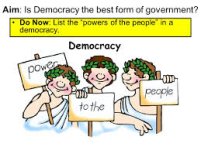In a world constantly battling between freedom and control, democracy stands as both a promise and a paradox. It gives the power to the people — yet it is often criticized for being slow, chaotic, and vulnerable to manipulation. So, the burning question remains: Is democracy truly the best form of government?
Democracy isn’t perfect. It’s messy. It’s loud. It’s filled with arguments, protests, and elections that never seem to end. But maybe, that’s exactly its strength. In a democracy, no single person or party holds unchecked power. Leaders are accountable. Dissent is allowed. Citizens have a voice — even if it’s one out of a million.
Winston Churchill famously said, “Democracy is the worst form of government — except for all the others.” Why? Because in monarchies, dictatorships, or theocracies, power is concentrated. Freedoms are often stripped. Choices disappear. In democracy, however flawed, people can challenge injustice, vote for change, and dream of a better tomorrow.
That said, democracy is only as strong as its people. Low voter turnout, misinformation, and corruption can weaken its foundation. Populism and polarization can hijack its ideals. But these are not flaws of the system — they are signs that we must participate more, not less.
When nurtured, democracy leads to innovation, inclusion, and peace. The world’s most stable and prosperous nations are, more often than not, democratic. Its flexibility allows societies to evolve — to recognize new rights, adapt to crises, and include voices once ignored.
But is it the best for every country, culture, or context? That’s where the debate heats up. Some argue that developing nations need strong, centralized rule before democracy can thrive. Others believe democracy must always be the end goal — even if the road is rough.
In the end, democracy isn’t just a system — it’s a responsibility. It demands action, education, and vigilance. It thrives not when it’s easy, but when it’s defended.
So, is democracy the best form of government?
Maybe not always the easiest. But definitely the most empowering.
Democracy isn’t perfect. It’s messy. It’s loud. It’s filled with arguments, protests, and elections that never seem to end. But maybe, that’s exactly its strength. In a democracy, no single person or party holds unchecked power. Leaders are accountable. Dissent is allowed. Citizens have a voice — even if it’s one out of a million.
Winston Churchill famously said, “Democracy is the worst form of government — except for all the others.” Why? Because in monarchies, dictatorships, or theocracies, power is concentrated. Freedoms are often stripped. Choices disappear. In democracy, however flawed, people can challenge injustice, vote for change, and dream of a better tomorrow.
That said, democracy is only as strong as its people. Low voter turnout, misinformation, and corruption can weaken its foundation. Populism and polarization can hijack its ideals. But these are not flaws of the system — they are signs that we must participate more, not less.
When nurtured, democracy leads to innovation, inclusion, and peace. The world’s most stable and prosperous nations are, more often than not, democratic. Its flexibility allows societies to evolve — to recognize new rights, adapt to crises, and include voices once ignored.
But is it the best for every country, culture, or context? That’s where the debate heats up. Some argue that developing nations need strong, centralized rule before democracy can thrive. Others believe democracy must always be the end goal — even if the road is rough.
In the end, democracy isn’t just a system — it’s a responsibility. It demands action, education, and vigilance. It thrives not when it’s easy, but when it’s defended.
So, is democracy the best form of government?
Maybe not always the easiest. But definitely the most empowering.

